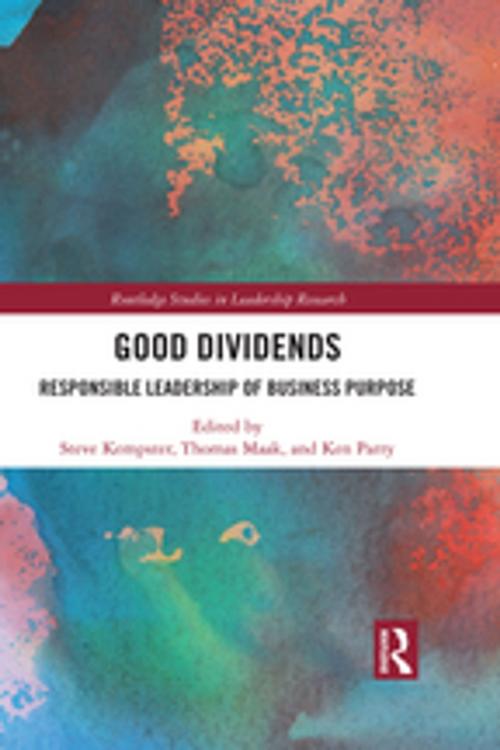Good Dividends
Responsible Leadership of Business Purpose
Business & Finance, Human Resources & Personnel Management, Organizational Behavior, Management & Leadership, Leadership, Management| Author: | ISBN: | 9781351591652 | |
| Publisher: | Taylor and Francis | Publication: | February 14, 2019 |
| Imprint: | Routledge | Language: | English |
| Author: | |
| ISBN: | 9781351591652 |
| Publisher: | Taylor and Francis |
| Publication: | February 14, 2019 |
| Imprint: | Routledge |
| Language: | English |
This book seeks to answer the question of ‘leadership for what?’. We shall outline an answer by focusing on responsible leadership of purpose through an inter-disciplinary perspective. Responsible leadership moves the axis of leadership from leader-followers to leader-stakeholders; away from looking at leadership as person-centric – the qualities, abilities, and effectiveness of the leader, to a focus on the purposes, responsibilities and activities of leadership. Leadership orientation is about realising value for a range of constituencies, not just the shareholders of the business. In this way this book offers up an alternative business model to that of dominant neo-liberal approaches to capitalism and its flow-on effect to the leadership project. This is a model that draws on a most obvious assumption – if leaders maximise the use of all the capitals of their business they will maximise their dividends, and thus deliver their responsibility to the shareholders as well as other relevant stakeholders.
This book explores how five dividends (based on five capitals) can be developed through attention to a sixth dividend (and sixth capital) – the dividend from our planet and communities. The planetary dividend is the flourishing of humanity – but it is also a significant dividend to the business. For example, by engaging the business in a purpose-led orientation to enhance the planetary dividend, the dividend from human resourcefulness becomes manifest – employee sense of purpose, commitment, passion and energy. The realisation of such can also connect with dividends from innovation, operations and brands. For example, the business benefits from a purpose-driven brand.
In short, responsible leadership of purpose outlines a case for leadership to focus on a connected portfolio of ‘good’ dividends as an answer to the question ‘leadership for what?’ The book is written by academics and organisational leaders. It draws on a range of research with leaders from a variety of contexts to illustrate the challenges but also the benefits of this argument. It is an ambitious book: ambitious, in terms of moving leadership towards realising purpose; ambitious by seeking to align a range of business disciplines around responsible leadership; and ambitious because it challenges the dominant assumptions that shape business leadership. However, it is based on a simple question: why would a business not wish to generate good dividends for all its stakeholders?
This book seeks to answer the question of ‘leadership for what?’. We shall outline an answer by focusing on responsible leadership of purpose through an inter-disciplinary perspective. Responsible leadership moves the axis of leadership from leader-followers to leader-stakeholders; away from looking at leadership as person-centric – the qualities, abilities, and effectiveness of the leader, to a focus on the purposes, responsibilities and activities of leadership. Leadership orientation is about realising value for a range of constituencies, not just the shareholders of the business. In this way this book offers up an alternative business model to that of dominant neo-liberal approaches to capitalism and its flow-on effect to the leadership project. This is a model that draws on a most obvious assumption – if leaders maximise the use of all the capitals of their business they will maximise their dividends, and thus deliver their responsibility to the shareholders as well as other relevant stakeholders.
This book explores how five dividends (based on five capitals) can be developed through attention to a sixth dividend (and sixth capital) – the dividend from our planet and communities. The planetary dividend is the flourishing of humanity – but it is also a significant dividend to the business. For example, by engaging the business in a purpose-led orientation to enhance the planetary dividend, the dividend from human resourcefulness becomes manifest – employee sense of purpose, commitment, passion and energy. The realisation of such can also connect with dividends from innovation, operations and brands. For example, the business benefits from a purpose-driven brand.
In short, responsible leadership of purpose outlines a case for leadership to focus on a connected portfolio of ‘good’ dividends as an answer to the question ‘leadership for what?’ The book is written by academics and organisational leaders. It draws on a range of research with leaders from a variety of contexts to illustrate the challenges but also the benefits of this argument. It is an ambitious book: ambitious, in terms of moving leadership towards realising purpose; ambitious by seeking to align a range of business disciplines around responsible leadership; and ambitious because it challenges the dominant assumptions that shape business leadership. However, it is based on a simple question: why would a business not wish to generate good dividends for all its stakeholders?















